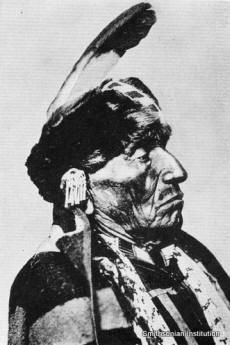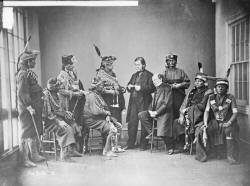|
 ON LINCOLN'S MIND ON LINCOLN'S MIND
A plea for help from the frontier
By the
editors of the Papers of Abraham Lincoln
 Send a link to a friend
Send a link to a friend
[September 21, 2013]
SPRINGFIELD -- Leading up to the
150th anniversary of the Gettysburg Address on Nov. 19, the Abraham
Lincoln Presidential Library and Museum will feature one letter each
week to or by Lincoln, written between the end of Battle of
Gettysburg on July 3, 1863, and his famous speech. Each letter
represents one of the many issues he had to face as chief executive
of the nation during its greatest crisis.
|
 In the Civil War years, another potential powder keg for Lincoln was
the growing tension between the federal government and Native
Americans on the frontier. The federal government paid relatively
close attention to its relations with Native Americans before the
war, but the rebellion in the South drew Lincoln's attention away
from the West. As a result, the often-corrupt federal Indian agents
were free to abuse their power even more than during peacetime,
while the Native Americans they were supposedly assisting grew
increasingly frustrated. Placed in federally supervised
reservations, many of these tribes depended on the government for
food and supplies. Any dip in this support could cause serious
repercussions. In the Civil War years, another potential powder keg for Lincoln was
the growing tension between the federal government and Native
Americans on the frontier. The federal government paid relatively
close attention to its relations with Native Americans before the
war, but the rebellion in the South drew Lincoln's attention away
from the West. As a result, the often-corrupt federal Indian agents
were free to abuse their power even more than during peacetime,
while the Native Americans they were supposedly assisting grew
increasingly frustrated. Placed in federally supervised
reservations, many of these tribes depended on the government for
food and supplies. Any dip in this support could cause serious
repercussions.

This tension showed itself most notably in the
Dakota rebellion of 1862, which resulted in the largest mass
execution in American history. However, resentments simmered in
tribes all over the frontier. In the petition linked below, several
leaders of the Kaw tribe in Kansas sought compensation from Lincoln
for items stolen from or promised to them by the federal government.
Typically, such calls went unanswered during the war, as Lincoln
simply did not have time to address them thoroughly.
Petition of
Is-tata Sin and others to Abraham Lincoln, July 17, 1863
(PDF)
[to top of second column] |

As the Kaw petitioners indicate, 70 of their tribesmen had enlisted
in the Union army. Nevertheless, this call for assistance appears to
have gone unanswered. Shortly after the Civil War, the federal
government had to allocate emergency funds to stave off starvation
among the Kaws. In 1872, the government removed the tribe to
Oklahoma to make room for white settlement on their lands in Kansas.
___
To see one of only five copies of the Gettysburg Address in
Lincoln's hand and receive a free booklet titled "On Lincoln's Mind:
Leading the Nation to the Gettysburg Address," containing this and
other document stories, visit the Abraham Lincoln Presidential
Library and Museum between Nov. 18 and 24.
[By the editors of the
Papers of
Abraham Lincoln. Text from file provided by the
Abraham
Lincoln Presidential Library and Museum
and received from the Illinois Historic
Preservation Agency]
 |